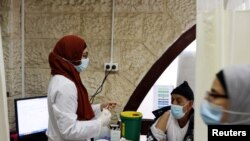Israel is the world leader in number of COVID-19 vaccinations per person, with 15 percent of the population already vaccinated. At the same time, the number of coronavirus infections is spiraling and Israel is going into another tight lockdown.
As of midnight on Thursday, all schools and nonessential businesses will close down, all gatherings will be outlawed, and Israelis are supposed to stay home for at least two weeks to try to get the numbers of new COVID-19 cases down. Shlomi Codish is the director General of the Soroka hospital in the southern Israeli city of Beersheva.
“Regretfully we’re seeing a surge in patients that is beyond what we saw in the previous wave of COVID-19 illness. We’re currently seeing 7,000 new patients daily, over that, we’re performing a lot of tests, a lot of vaccinations, but we’re seeing a lot of seriously ill patients," said Codish. "We’re currently at 873 critically sick patients nationwide which is a number that is considered around the threshold of the health care system capacity.”
This is the third time that Israel has gone to a lockdown since the COVID-19 crisis began last March. In previous times, various sectors of the population ignored the rules. Ultra-Orthodox Jews kept their religious schools open, and many among the Arab population continued to hold large weddings.
This time, the wedding season is over, and influential ultra-Orthodox rabbis have called for schools to close at least for a few days. Shlomi Codish from Soroka hospital believes Israel could have avoided this total lockdown.
“If we had better public trust, better understanding of what the deal really is here, we would have been able to implement less strict measures two or three weeks ago," said Codish. "Regretfully we’re now at a point where disease patterns are spiraling out of control and we need to fully lock down the Israeli public activity altogether.”
Israeli Prime Minister Benjamin Netanyahu has promised that Israel will be the first country to beat the coronavirus and reopen the economy.
Israel rolled out a vaccination program less than three weeks ago that has seen more than one-point-five million Israelis, most of them over 60 or with chronic conditions, vaccinated.
Part of the reason the government was able to move so fast is that every Israeli is a member of one of four health insurance plans that keep computerized medical records. Israel is also a small country with just over nine million people.
Israeli press reports say that Israel has paid Pfizer about $30 per dose, significantly more than other countries, to ensure millions of doses of its vaccine. Israel is also expected to get the Moderna vaccine in the coming days.
Two weeks after receiving their second dose of the vaccine, Israelis will get a green passport that will enable them to travel freely, avoid quarantine when returning from abroad, and participate in cultural events.





